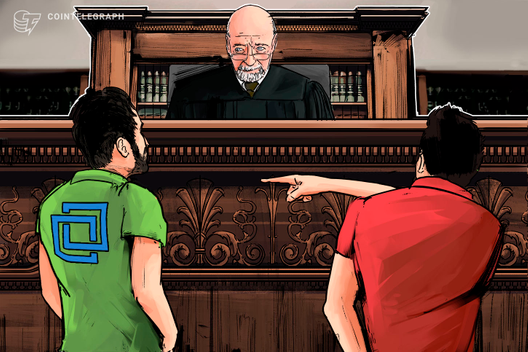The SEC is targeting Coinbase, Binance as proxies in its war on crypto
Imagine your daily commute to work, uninterrupted by traffic lights or stop signs, allowing you to sail smoothly. Suddenly, a new red stop sign disrupts your route, turning a main intersection into a four-way stop overnight. That evening, a letter from local law enforcement shocks you with a hefty retroactive fine for every time you passed the spot where the new sign stands today.
Absurd as it seems, this analogy encapsulates the United States Securities and Exchange Commission’s approach in its lawsuits against Coinbase and Binance.
The SEC throws a one-two punch
The SEC alleges in its lawsuits that the two companies operated “unregistered” exchanges and sold “unregistered” securities. Its case against Binance alleges misconduct such as internal wash trading and self-dealing to artificially inflate trading volumes, indicating a focus on appearance over ethical business practices.
Related: Gary Gensler is hurting the little guys for Wall Street
It also questions Binance.US’ independence from its parent company, Binance International, suggesting the latter held significant control over its U.S. branch. The SEC is making that case because it could extend the agency’s jurisdiction to the broader Binance International organization.
Today we charged Binance Holdings Ltd. (Binance); U.S.-based affiliate, BAM Trading Services Inc., which, together with Binance, operates https://t.co/swcxioZKVP; and their founder, Changpeng Zhao, with a variety of securities law violations.https://t.co/H1wgGgR5ir pic.twitter.com/IWTb7Et86H
— U.S. Securities and Exchange Commission (@SECGov) June 5, 2023
The SEC also labels multiple products offered on the U.S. platform as securities, including Binance’s BNB (BNB), Binance USD (BUSD), BNB Vault and Simple Earn programs, and highlights the alleged commingling and diversion of customer funds. The SEC’s action against Binance, given these allegations, suggests a company playing fast and loose with regulations and customer funds.
Coinbase: The rule follower?
On the other side of the coin (pun intended), we have Coinbase. Coinbase, unlike Binance, has largely adhered to regulations, even becoming a publicly listed, regulated U.S. exchange. Yet, the SEC’s lawsuit alleges Coinbase operates as an unregistered exchange, broker and clearing agency. The SEC claims certain tokens and staking programs Coinbase offers are unregistered securities. Interestingly, the SEC also asserts that Coinbase’s noncustodial digital wallet equates to providing a brokerage service.

The SEC’s decision to label specific tokens as securities suggests an evolving stance to view almost all cryptocurrencies, excluding Bitcoin (BTC) and possibly Ether (ETH), as securities. Despite these allegations, Coinbase, known for its regulatory compliance and transparency, plans to contest these allegations in court.
The road ahead
The SEC’s lawsuits against Coinbase and Binance raise critical questions about the SEC’s intentions and the future of crypto. Despite this, some believe the SEC is unlikely to win the suit against Coinbase due to a fatal flaw: SEC Chair Gary Gensler’s admission that the SEC lacks congressional authority to regulate crypto exchanges.
1/ If the SEC follows through on its threat to sue @Coinbase, I believe the SEC will lose.
The SEC’s case has a fatal flaw.
And the problem is entirely of @GaryGensler’s own making.
Let me explain…
— MetaLawMan (@MetaLawMan) May 3, 2023
Coinbase’s CEO, Brian Armstrong, confidently predicts a win for Coinbase, arguing that the SEC’s action is unfair given Coinbase’s efforts to seek regulatory clarity. In a recent Wall Street Journal interview, he said:
“This is not a good fact pattern for them [the SEC] that a jury or a judge would look at [and] say, ‘Look, this company was formally petitioning you for clarity. They met with you 30 times. They developed their own internal framework working with the best lawyers in the world, and you never gave them any feedback on it. And then you hit them with this enforcement action. That’s not fair, and that’s not good for America.’”
This legal battle could take years to resolve. Ideally, Congress would provide clear laws for digital asset markets. Recently, Representatives Patrick McHenry and Glenn Thompson introduced a digital asset market structure proposal aiming to provide regulatory clarity, foster innovation and protect consumers. This development could be a game changer.
Related: Crypto enthusiasts are wrong to target Gary Gensler
The SEC’s actions could drive crypto companies away from the U.S. and weaken domestic consumer confidence in crypto. This could create opportunities for other jurisdictions such as Hong Kong, Dubai, Singapore and the United Kingdom to attract crypto innovation and capital.
In the short term, there could be a downturn in crypto stocks, altcoins and U.S.-based crypto startups. Investors may divest toward Bitcoin or stablecoins. In the long term, exchanges may be cautious when dealing with U.S. customers and providing access to what the SEC claims to be securities. For instance, Robinhood announced it would delist tokens for Solana, Cardano and Polygon after the SEC suit named them as securities.
Crypto fights back
Crypto investors and companies can fight back against these charges and advocate for a more crypto-friendly regulatory environment. Support can be given to advocacy groups like Coin Center, Coinbase and the Digital Freedom Alliance, which are pushing for policies that foster innovation and protect investors.
— Warren Davidson (@WarrenDavidson) June 12, 2023
Advocacy also involves contacting local congressional leaders to express concerns about the current anti-crypto regulatory climate.
Some representatives, like Ohio Congressman Warren Davidson, are already advocating for crypto, with Davidson filing the SEC Stabilization Act and the #FireGaryGensler campaign gaining traction on Twitter.
While the SEC’s lawsuits against Coinbase and Binance are a significant turning point, they also present an opportunity for the crypto community to advocate for its rights and shape the future of crypto in the U.S. Let’s seize it.
Trevor Ward is the director of content marketing at Bitwave. A graduate of Brigham Young University, he previously co-founded and served as the CEO of Multisig Media.
This article is for general information purposes and is not intended to be and should not be taken as legal or investment advice. The views, thoughts and opinions expressed here are the author’s alone and do not necessarily reflect or represent the views and opinions of Cointelegraph.









